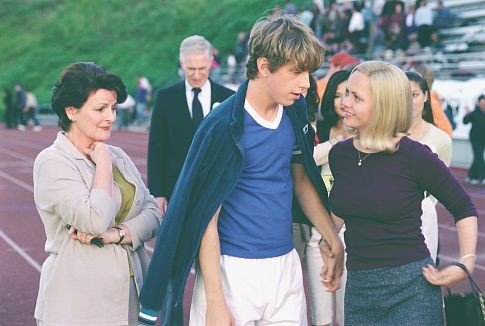From the July 26, 2002 Chicago Reader. –J.R.
Pumpkin
*** (A must-see)
Directed by Adam Larson Broder and Tony R. Abrams
Written by Broder
With Christina Ricci, Hank Harris, Brenda Blethyn, Dominique Swain, Marisa Coughlan, Sam Ball, Harry Lennix, and Nina Foch.
When the New German Cinema started overtaking the French New Wave as a fashionable movement 30 years ago I felt alienated, as if someone had declared a major source of my moviegoing pleasure out-of-bounds. Taking the place of joie de vivre and jazzy invention were cynical disillusionment and cookie-cutter formal patterning — a new kind of style and content that its champions called subversive and its detractors (including me) called defeatist. Whether the mood was sarcastic (Rainer Werner Fassbinder), flamboyant (Werner Herzog), lyrical (Wim Wenders), or hieratic (Werner Schroeter), the overall message seemed to be that people and social conditions were doomed to remain mired in ruts and that hope was for suckers. The 70s were supplanting the 60s, and being glad you were alive was suddenly seen as wimpy and naive.
Little did I realize that this pessimism would remain in the culture while the German films heralding it would be forgotten even faster than the earlier French ones. I have to admit that I was won over by the sarcasm of at least one Fassbinder movie, Martha (1973), a parody of bourgeois marriage and Douglas Sirkean Hollywood melodrama that tells the horrific story of a virgin librarian marrying a sadist and remaining a dutiful hausfrau until she winds up in a wheelchair. But 20 more years would pass before another film, Satantango, by an apt pupil of Fassbinder, Bela Tarr — ignoring Hollywood and melodrama because he didn’t need them — would convince me that sarcasm can be a lethal weapon for the left when confronting spectators with their own hypocrisy.
“A comedy for the romantically challenged,” declare some of the ads for Pumpkin, a modest yet nervy youth comedy that starts off as satire before veering into hysterically overdetermined melodrama with a satiric edge — in relation to PC attitudes and the deeper social problems that provoke those attitudes. The resourceful Christina Ricci originally took on this project as a producer, only later deciding to play the lead, and among the executive producers is Francis Ford Coppola, one of the few American filmmakers around nowadays who knows what the New German Cinema was about. Most of the movie aims for laughter of one kind or another while maintaining a serious purpose, yet the reasons we laugh undergo radical and disconcerting shifts. Sometimes we’re laughing complacently at the characters, and sometimes we’re laughing less complacently at our own responses — which is to say that the film’s objects of ridicule are both its characters and its audience.
Disability is a subject that often wins people Oscars, chiefly because it makes audiences feel virtuous. So I’d be dumbstruck if Pumpkin earned any nominations, because it makes us feel like clods. The title is the nickname of a disabled teenage athlete (played by Hank Harris, who isn’t disabled), sometimes called a “retard,” but only by people who don’t know any better. We aren’t told the source of his disability — a lack of coordination that requires him to spend much of his time in a wheelchair and sometimes affects his speech patterns — but we can infer that he was probably born with it.
The leading character in Pumpkin isn’t Pumpkin but Carolyn McDuffy (Ricci), a blond princess from Pasadena who, when the story begins, is driving her convertible to her sorority at Southern California State University, where she’s starting her senior year. She’s the only blond member of Alpha Omega Pi, which prides itself on its ethnic diversity — it has Filipino and Chinese members — especially because it’s directly across the street from a rival sorority full of tall, Nordic-looking blonds (“mastodons,” as one AOPi member puts it). Hoping to win a sorority-of-the-year sweepstakes, AOPi has taken on the task of mentoring Riverside County’s physically and mentally handicapped athletes in preparation for their yearly match against Orange County. At first Carolyn and her roommate, Jeanine (Dominique Swain, best known as the lead in Adrian Lyne’s Lolita), worry that this move will hurt AOPi’s image, and they’re roundly reprimanded by the PC sorority president (Marisa Coughlan). Yet Jeanine is so uncomfortable with the setup that when the busload of athletes arrives and she sees the one she’s been assigned to, she runs away in fear and disgust. Carolyn more gamely sticks with her charge — the sweet-tempered Pumpkin, who immediately shows that he’s devoted to her — but she can’t help admitting how freaked-out she is to her boyfriend, Kent (Sam Ball), a hyperbolically hunky tennis champ.
It’s an unlikely prelude to Carolyn’s confused discovery that she’s fallen in love with Pumpkin, though the filmmakers — directors Adam Larson Broder and Tony R. Abrams, working with Broder’s script — first have her plan a disastrous double-date beach outing in which she links Pumpkin up with a lonely, overweight girl from her poetry workshop, who’s insulted by the match and asks to be driven home. Unexpectedly, Kent — who proves to be the most variable and unpredictable character in the story — criticizes Carolyn for her insensitivity, which throws her into such an emotional tailspin that she leaves Pumpkin alone on the beach. She doesn’t realize what she’s done until she’s in the middle of a conference with her poetry teacher, who berates her for the falseness of her “Ode to Pasadena,” and she suddenly finds herself agreeing with him. Startled, he asks, “What made this happen?” and her priceless response, before rushing out, is “Something I left on the beach.”
If we respond to this comic epiphany by complaining that the odds of someone like Carolyn falling in love with someone she regards as a thing are extremely slim — and that many subsequent plot developments involving both characters are even more implausible — the filmmakers are well ahead of us. “Our intention was never to make the relationship between Carolyn and Pumpkin completely believable,” Abrams says in the film’s press book; no less relevantly, Broder insists that a desire to mix genres and genre expectations, which he playfully calls “genrefication,” is central to the film. This means that the increasing unreality of what we’re watching obliges us to come up with some kind of realistic alternatives — which we can’t do without embarrassing ourselves. For what we consider “realistic” and “unrealistic” usually has some ideological basis — a set of mainly tacit assumptions about how society works as well as how it’s supposed to work — and we can’t truly address what we find believable without scraping against some of those assumptions.
Pumpkin forces us to think about style as well as content rather than simply go with the narrative flow. After Carolyn gets caught in bed with Pumpkin by his overly protective mother (Secrets & Lies‘ Brenda Blethyn, ably playing an American lush) — who declares, “You raped my son!” — she’s promptly ejected from AOPi, and her sorority sisters flank her exit, as if they were chorus girls in a musical comedy. When, several tragedies later, she again quits the sorority, this time voluntarily, it’s because she’s decided to leave Southern California State as an act of penance and transfer to a community college. She discovers she has too many credits and winds up enrolling at Long Beach Tech instead, finding a room in an appropriately decrepit building with broken windows, where it’s only natural that we see chickens crossing the front lawn.
Piling on the cheesy overkill, the movie sarcastically implies that we require this kind of exaggeration if we’re going to accept such an impossible romance. But accepting any alternative is made to seem equally ludicrous. Carolyn writes two awful poems that chart her moral progress: the first is “Ode to Pasadena,” and the second features the line “I once had a dream that I could turn pumpkins into coaches, but the world said no.” In other words, by presenting an impossible romance in an impossible world, Pumpkin dares us to say why either is impossible — which forces us to confront what’s possible and what we might do to make it so.





